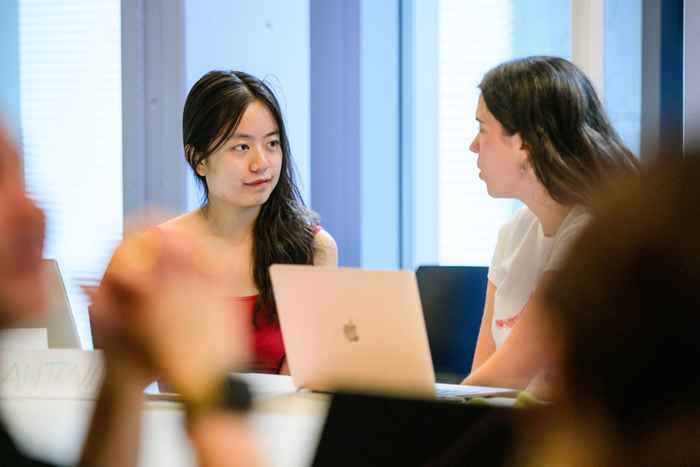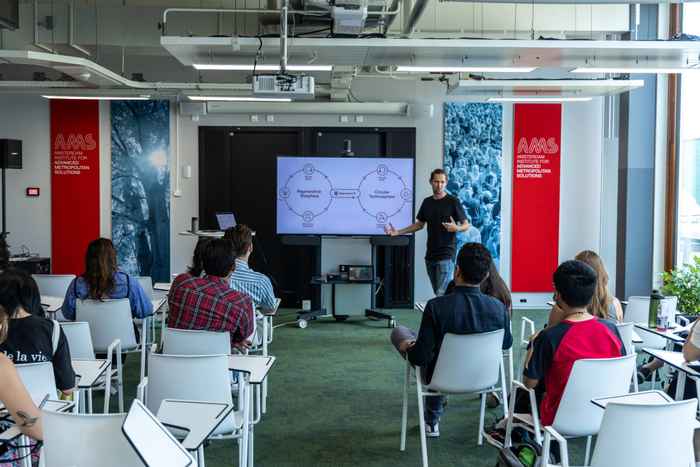Comprehensive Introduction to Research Methodology and Design
This online programme provides students with a deep-dive into qualitative and quantitative research methodologies, as well as the basics of (mixed-method) research design. This programme is designed primarily for students who are entering a master's programme at the Graduate School of Social Sciences and also accepts applications from external candidates interested in honing their research methodology skills.



-
Programme at a glance
Mode of instruction: Online (4 weeks) Academic dates: Monday 30 June - Friday 25 July 2026 Academic fees: €900 for incoming GSSS Master's students and UvA employees
€1250 for external applicants
read more about what is includedAdmissions Deadline External Candidates: Early-Bird: 1 February 2026
Regular: 1 May 2026
Admission deadline Incoming UvA Graduate School of Social Sciences Master’s students: As soon as possible, latest deadline: 1 June 2026 -
Programme description
This course aims to lay a solid, diverse and integrated foundation of knowledge and skills for conducting first-rate qualitative and quantitative research, and for embedding it in effective and feasible mixed-method research designs. At the end of this intensive course, students should have acquired a good understanding of the most important principles and practices of social science research. They should also be able to improve their knowledge and skills independently after the course, and thus pursue their substantive research interests without methodological hindrance.
The course starts with the presentation and discussion of the most important qualitative methods (participant observation as a key element of ethnographic research, the interview, and the focus group discussion), paying attention to their epistemological foundations and to their practical application in different disciplines such as anthropology, sociology or political science. In these sessions, issues related to the collection, analysis and presentation of qualitative data will be discussed, with a special emphasis on the semi-structured interview and on every step of qualitative text analysis. The course then focuses on the inferential possibilities and limitations of various case selection strategies, which will introduce students not only to a crucial issue of research design, but also to an essential topic in the vast domain of (comparative) case study research.
The quantitative component of the course introduces students to the statistical analysis of social science data. Topics include quantitative research design, descriptive statistics, and inferential statistics. In this part of the course, each session is paired, on the same day, with a lab session where students will become acquainted with the statistical software SPSS, while working with real-life survey data.
Finally, the course delves into the thorny issue of bridging the qualitative-quantitative divide, with a session on mixed-method research designs. Each of these three components of the course (qualitative, quantitative, research design) ends with its own practical assignment.
Programme goals
At the end of this course, students should be able to:
- understand the key notions and principles behind qualitative and quantitative approaches to data collection and analysis;independently conduct qualitative research on a given topic using primarily self-generated interview data;
- independently conduct a short quantitative analysis on a given topic, using the SPSS software and real-life survey data;
- independently develop a short but sound mixed-method research design on a given topic, combining different case selection strategies in a meaningful and effective manner;
- critically assess the value and validity of published research that uses a qualitative, quantitative or mixed-method design.
Assessment
The assessment will be based on three short assignments, dealing with: (1) qualitative methods; (2) quantitative methods; and (3) research design. Each of the three assignments needs to be judged as (at least) satisfactory in order for the student to pass the course (i.e. each of them is a necessary condition for passing the course). All assignments will be evaluated and returned to the students with written feedback. A detailed overview of the requirements for each of the assignments will be provided at the beginning of the course.
Study load
This is an intensive course, covering in just four weeks material that is usually taught in 2-3 months in a university setting. Participants should therefore expect to need a few hours of work every day; depending on the day, this may mean reading, watching knowledge clips, participating in online live sessions, working on homework, conducting research for the final assignments, etc. However, the programme – now in its 12th edition with the same academic director – is carefully designed to allow for sufficient flexibility in how students organize their work within the various deadlines. Due to a high number of participants, students will be broken down into sub-groups. The daily/weekly schedule will be made available to all participants in the weeks leading up to the programme.
Credits
Incoming Master's students who are taking this course to prepare for their Master's will not receive credits. Other candidates are eligible to gain credits for this programme, for a total value of 6 EC. If you are an external candidate, please see the Practical Matters for Online Courses page for more information.
-
Who is this programme for?
Incoming UvA Master's students in the Graduate School of Social Sciences have priority, however each year we accept additional (UvA and non-UvA) candidates. All students must have a Bachelor's degree (minimum). For external candidates, preference is given to current Master and PhD students.
Additional information for incoming master’s students:
The Admissions Board has come to the conclusion that your background in social science research methodology is not yet sufficient to warrant admission to one or our GSSS master’s programmes. Comprehensive Introduction to Research Methodology and Design is specifically designed to address this deficiency and covers, in one month, the material that would take up to a Semester to be studied in a typical Social Science Bachelor's programme. You will need to have completed the course before the start of the Master's programme. If you fail to pass the course, the admission decision will be revoked.
You can also make up for this deficiency by completing a related course in the field of social science research methodology, amounting to 10 EC. In that case it is necessary to provide the admissions office with a course description of the course you have chosen, so the Admissions Committee will be able to assess if that alternative course meets the criteria. If so, you will need to have completed the course before the start of the master’s programme and send the admissions office an official proof of completion. You can reach the admissions office via: apply-gsss@uva.nl
Additional information for pre-master students:
Pre-master students doing a 54 of 60 EC programme that starts in september 2026 take Comprehensive Introduction to Research Methodology and Design in summer 2026.Pre-master students doing a 30 EC programme starting in september 2026 take Comprehensive Introduction to Research Methodology and Design in summer 2027.
Pre-master students doing a 30 EC programme starting in februari 2027 take Comprehensive Introduction to Research Methodology and Design in summer 2027.
-
Academic director
Alex Voicu is a lecturer in the Political Science Department (Afdeling Politicologie) of the Faculty of Social and Behavioural Sciences (FMG), and is Academic Director of the Comprehensive Introduction to Research Methodology and Design. He has designed and taught courses on party politics, international relations, and social science methodology. His courses, workshops and guest lectures have had audiences from a variety of disciplines (political science, international relations, anthropology, sociology, human geography, development studies, medicine) and academic levels (BA, MA, Research Master, PhD). Alex received an honorable mention in the UvA Lecturer of the Year (Docent van Het Jaar) 2014 competition, recognizing his place among the top 5 lecturers in the faculty that year. His own research deals with political elite recruitment and its implications for democratic representation in Romania, Hungary and the UK.
-
Explore our community
Want to get to know more about studying at the University of Amsterdam? Follow us on social media and join our summer community. Get a feel for our summer school vibe and our academic and social community, and learn about studying with us through the eyes of past summer school students.
- Mode
- Online
- Credits
- 0 ECTS, 4 weeks
- Language of instruction
- English
- Starts in
- July